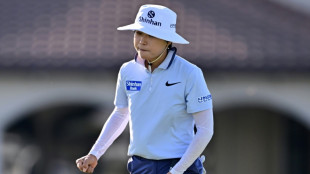

'Biggest' Women's Asian Cup can help drive change, says top official
Next year's Women's Asian Cup can help break down barriers for women in the region, a lead organiser told AFP, saying it will be the biggest tournament in its history.
Australia will host the 12-team competition on March 1-21, having successfully staged the FIFA Women's World Cup in 2023 along with New Zealand.
That competition broke records on and off the pitch while women's football has boomed in Europe, with this summer's continental championships in Switzerland played out to unprecedented crowds.
Sarah Walsh, an Australian former international player and now chief operating officer of the local organising committee for next year's tournament, admitted that Asia is playing catch-up in that respect.
Some countries in the region are lagging when it comes to gender equality in society, but football can play a part.
"Any time we platform women, particularly on broadcast, or in the centre of the pitch when there's 40,000 people watching, absolutely (it can have a wider impact)," Walsh said on the sidelines of a Hong Kong football conference.
"There are still inequalities in Australia, and I think that platforming the Matildas on the world stage and where 75 percent of Australians watch has a significant impact on social attitudes towards women.
"So when you think about that, of course it can also do it in other countries," she added.
"(Football) has that ability to progress things by putting women at the forefront."
- 'Challenging' -
The Australian women's team, the Matildas, reached the semi-finals of their home World Cup two years ago and regularly draw sell-out crowds, even for friendlies.
Their last-four defeat to England in Sydney was attended by 76,000 spectators while 11 million people -- out of a population of 27 million -- tuned in to watch.
There is no concern about the locals turning out en masse again in March for the Matildas, but Walsh knows that "it will be challenging to fill out the stadiums" for some other games.
"Europe is leading the way with the Euros, but I think that we have a lot of catching up to do as well," said Walsh.
As well as the Matildas, Japan, North Korea and title-holders China will all be serious contenders.
At the other end of the scale, Bangladesh are at the Women's Asian Cup for the first time.
"I spend more of my time thinking about this than anything else," said Walsh about how the tournament can replicate the kinds of crowds and interest generated by the European equivalent.
Organisers have multiple solutions, including drawing on Australia's multi-cultural communities.
Early ticket sales have been promising, said Walsh.
She told the World Football Summit in Hong Kong on Wednesday that next year's 21st edition "will absolutely be the biggest Women's Asian Cup ever".
But Walsh said a one-off successful tournament, including strong television audiences in Asia, is just the start.
"You only have to look at the investment that's happening, particularly in the Middle East, and how we think that might translate to women's football," she said, adding that while Saudi Arabia will not be at this Asian Cup, "it's just a matter of time".
"It's all moving in the right direction," she said.
"We have a responsibility as hosts -- and also in my role on the AFC (Asian) women's committee -- to make sure that this isn't just 21 days of fun but that we are progressing the development of the countries that are playing in the finals."
G.Fontana--GdR



